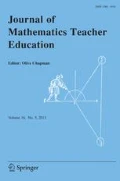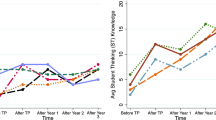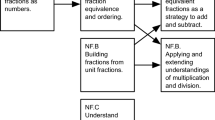Abstract
This study examines the association between mathematical knowledge for teaching and instructional quality in a sample of first-year elementary school teachers. Ten teachers completed the mathematical knowledge for teaching (MKT) survey at the end of teacher preparation. Three mathematics lessons taught during their first year of teaching were videotaped and scored using the Mathematical Quality of Instruction. Findings replicate prior studies that were conducted with more experienced teachers. A strong, positive and statistically significant association was found between teacher knowledge and the mathematics is clear and not distorted dimension of instructional quality. In addition, associations of moderate strength were found between MKT and other dimensions of instructional quality centered on the mathematics taught in the lesson. Analyses also revealed individual differences among teachers and raised the question of what other factors might impact instructional quality. Three cases studies highlight the role of lesson design, mathematics tasks, and participation structures that support or inhibit instructional quality and the use of knowledge during teaching. Conclusions suggest that preparation and induction programs should include a focus on individual teachers’ mathematical knowledge for teaching, the development of a student-centered vision of mathematics instruction, and tailored support during the first year of teaching.

Similar content being viewed by others
References
Ball, D. L. (1993). With an eye on the mathematical horizon: Dilemmas of teaching elementary school mathematics. The Elementary School Journal, 93(4), 373–397.
Ball, D. L., Thames, M. H., & Phelps, G. (2008). Content knowledge for teaching: What makes it special? Journal of Teacher Education, 59(5), 389–407.
Baumert, J., Kunter, M., Blum, W., Brunner, M., Voss, T., Jordan, A., et al. (2010). Teachers’ mathematical knowledge, cognitive activation in the classroom, and student progress. American Educational Research Journal, 47(1), 133–180.
Blömeke, S., Olsen, R. V., & Suhl, U. (2016). Relation of student achievement to the quality of their teachers and instructional quality. In T. Nilsen & J.-E. Gustafsson (Eds.), Teacher quality, instructional quality and student outcomes (pp. 21–50). Amsterdam: International Association for the Evaluation of Educational Achievement (IEA). https://doi.org/10.1007/978-3-319-41252-8.
Blömeke, S., & Star, J. R. (2016). Perception, interpretation and decision making: Understanding the missing link between competence and performance. ZDM-The International Journal on Mathematics Education, 48(1–2), 219–226.
Borko, H., Eisenhart, M., Brown, C., Underhill, R., Jones, D., & Agard, P. C. (1992). Learning to teach hard mathematics: Do novice teachers and their instructors give up too easily? Journal for Research in Mathematics Education, 23(3), 194–222.
Boston, M. D., Boston, M. D., Wolf, M. K., & Wolf, M. K. (2006). Assessing academic rigor in mathematics instruction: The development of Instructional Quality Assessment Toolkit (CSE Tech. Rep. No. 672). Los Angeles: University of California, National Center for Research on Evaluation, Standards, and Student Testing (CRESST).
Carrillo-Yañez, J., Nuria Climent, N., Montes, M., Contreras, L. C., Flores-Medrano, E., Escudero-Ávila, D., et al. (2018). The mathematics teacher’s specialised knowledge (MTSK) model. Research in Mathematics Education, 20(3), 236–253.
Cazden, C. B. (2001). Classroom discourse: The language of teaching and learning (2nd ed.). Portsmouth, NH: Heinemann.
Center for Education Policy Research. (n.d.a). Mathematical quality of instruction (MQI). Retrieved October 16, 2019 from https://cepr.harvard.edu/mqi-access.
Center for Education Policy Research. (n.d.b). Whole lesson codes [unpublished training module for the mathematics quality of instruction]. Retrieved October 16, 2019 from https://cepr.harvard.edu/mqi-access.
Charalambous, C. Y., & Praetorius, A. K. (2018). Studying mathematics instruction through different lenses: Setting the ground for understanding instructional quality more comprehensively. ZDM: The International Journal of Mathematics Education, 50(3), 355–366.
Common Core State Standards Initiative (CCSSI). (2010). National Governors Association Center for Best Practices and Council of Chief State School Officers. Retrieved October 16, 2019 from http://www.corestandards.org/assets/CCSSI_Math%20Standards.pdf.
Copur-Gencturk, Y. (2015). The effects of changes in mathematical knowledge on teaching: A longitudinal study of teachers’ knowledge and instruction. Journal for Research in Mathematics Education, 46(3), 280–330.
Delaney, S. F., Ball, D. L., Hill, H. C., Schilling, S. G., & Zopf, D. A. (2008). Mathematical knowledge for teaching: Adapting U.S. measures for use in Ireland. Journal of Mathematics Teacher Education, 11, 171–197.
Desimone, L. M., Hochberg, E. D., & McMaken, J. (2016). Teacher knowledge and instructional quality of beginning teachers: Growth and linkages. Teachers College Record, 118, 1–54.
European Mathematical Society - Education Committee. (2012). It is necessary that teachers are mathematically proficient, but is it sufficient? Solid findings in mathematics education on teacher knowledge. Newsletter of the European Mathematical Society, 83, 46–50.
Fennema, E., & Franke, M. L. (1992). Teachers’ knowledge and its impact. In D. A. Grouws (Ed.), Handbook of research on mathematics teaching and learning (pp. 147–164). New York: Macmillan.
Gearhardt, M., Saxe, G. B., Seltzer, M., Schlackman, J., Ching, C. C., Nasir, N., et al. (1999). Opportunities to learn fractions in elementary classrooms. Journal for Research in Mathematics Education, 30(3), 286–315.
Harris, D. N., & Sass, T. R. (2011). Teacher training, teacher quality and student achievement. Journal of Public Economics, 95(7–8), 798–812.
Hiebert, J., Carpenter, T. P., Fennema, E., Fuson, K. C., Wearne, D., Murray, H., et al. (1997). Making sense: Teaching and learning mathematics with understanding. Portsmouth, NH: Heinemann.
Hiebert, J., Stigler, J. W., Jacobs, J. K., Givvin, K. B., Garnier, H., Smith, M., et al. (2005). Mathematics teaching in the United States today (and tomorrow): Results from the TIMSS 1999 Video Study. Educational Evaluation and Policy Analysis, 27, 111–132.
Hill, H. C. (2010). The nature and predictors of elementary teachers’ mathematical knowledge for teaching. Journal for Research in Mathematics Education, 41(5), 513–545.
Hill, H. C., Blunk, M., Charalambous, C., Lewis, J., Phelps, G. C., Sleep, L., et al. (2008). Mathematical knowledge for teaching and the mathematical quality of instruction: An exploratory study. Cognition and Instruction, 26(4), 430–511.
Hill, H. C., Charalambous, C. Y., Blazar, D., McGinn, D., Kraft, M. A., Beisiegel, M., et al. (2012). Validating arguments for observational instruments: Attending to multiple sources of variation. Educational Assessment, 17(2–3), 88–106.
Hill, H. C., Rowan, B., & Ball, D. L. (2005). Effects of teachers’ mathematical knowledge for teaching on student achievement. American Educational Research Journal, 42(2), 371–406.
Hill, H. C., Schilling, S. G., & Ball, D. L. (2004). Developing measures of teachers’ mathematics knowledge for teaching. Elementary School Journal, 105, 11–30.
Hill, H. C., Umland, K. L., & Kapitula, L. R. (2011). A validity argument approach to evaluating value-added scores. American Educational Research Journal, 48(3), 794–831.
Ho, A. D., & Kane, T. J. (2013). The reliability of classroom observations by school personnel. Research paper. MET Project. Seattle: Bill and Melinda Gates Foundation.
Horizon Research. (2000). Inside the classroom observation and analytic protocol. Chapel Hill, NC: Horizon Research Inc.
Jaworski, B. (2006). Theory and practice in mathematics teaching development: Critical inquiry as a mode of learning in teaching. Journal of Mathematics Teacher Education, 9(2), 187–211.
Kane, T. J., Rockoff, J. E., & Staiger, D. O. (2008). What does certification tell us about teacher effectiveness? Evidence from New York City. Economics of Education Review, 27(6), 615–631.
Kersting, N. B., Givvin, K. B., Thompson, B. J., Santagata, R., & Stigler, J. W. (2012). Measuring usable knowledge: Teachers’ analyses of mathematics classroom videos predict teaching quality and student learning. American Educational Research Journal, 49(3), 568–589.
Learning Mathematics for Teaching Project. (2011). Measuring the mathematical quality of instruction. Journal of Mathematics Teacher Education, 14(1), 25–47.
Ma, L. (1999). Knowing and teaching elementary mathematics: Teachers understanding of fundamental mathematics in China and the United States. Hillsdale, NJ: Erlbaum.
Makel, M. C., & Plucker, J. A. (2014). Facts are more important than novelty: Replication in the education sciences. Educational Researcher, 43(6), 304–316.
Mantzicopoulos, P., French, B. F., & Patrick, H. (2018). The mathematical quality of instruction (MQI) in kindergarten: An evaluation of the stability of the MQI using generalizability theory. Early Education and Development, 29(6), 893–908.
Putnam, R. T., Heaton, R. M., Prawat, R. S., & Remillard, J. (1992). Teaching mathematics for understanding: Discussing case studies of four fifth-grade teachers. The Elementary School Journal, 93(2), 213–228.
Rowland, T. (2008). Researching teachers’ mathematics disciplinary knowledge. In P. Sullivan & T. Wood (Eds.), The international handbook of mathematics teacher education, vol. 1: Knowledge and beliefs in mathematics teaching and teaching development (pp. 273–300). Rotterdam: Sense Publishers.
Rowland, T., Huckstep, T., & Thwaites, A. (2005). Elementary teachers’ mathematics subject knowledge: The knowledge quartet and the case of Naomi. Journal of Mathematics Teacher Education, 8, 255–281.
Santagata, R., Kersting, N., Givvin, K., & Stigler, J. W. (2011). Problem Implementation as a lever for change: An experimental study of the effects of a professional development program on students’ mathematics learning. Journal of Research on Educational Effectiveness, 4, 1–30.
Santagata, R., & Sandholtz, J. (2019). Pre-service teachers’ mathematics teaching competence: Comparing performance on two measures. Journal of Teacher Education, 70(5), 472–484.
Sawada, D., & Pilburn, M. (2000). Reformed teaching observation protocol (RTOP). Tempe: Arizona State University: Arizona Collaborative for Excellence in the Preparation of Teachers.
Schlesinger, L., & Jentsch, A. (2016). Theoretical and methodological challenges in measuring instructional quality in mathematics education using classroom observations. ZDM Mathematics Education, 48(1–2), 29–40.
Shulman, L. S. (1986). Those who understand: Knowledge growth in teaching. Educational Researcher, 15(2), 4–14.
Shulman, L. S. (1987). Knowledge and teaching: Foundations of the new reform. Harvard Educational Review, 57(1), 1–22.
Stigler, J. W., & Hiebert, J. (1999). The teaching gap: What educators can learn from the world’s best teachers. Free Press.
Tatto, M. T., Schwille, J., Senk, S. L., Ingvarson, L., Peck, R., & Rowley, G. (2008). Teacher education and development study in mathematics (TEDS-M): Conceptual framework. Policy, practice, and readiness to teach primary and secondary mathematics. East Lansing, MI: Teacher Education and Development International Study Center, College of Education, Michigan State University.
U.S. Department of Education. (2013). Preparing and credentialing the nations teachers: The Secretary’s ninth report on teacher quality. Washington, DC: U.S. Department of Education.
Yin, R. (2014). Case study research (5th ed.). Thousand Oaks, CA: Sage.
Acknowledgements
The authors thank the teachers for their participation and for opening their classroom door and making their instruction public. In addition, they are grateful to Janet Mercado and Cathery Yeh who assisted with data collection and organization; to Rosalind Alicia Ball who scored lesson videos for inter-rater reliability; and to several undergraduate research assistants who completed lesson transcriptions.
Funding
This research was supported by the National Science Foundation (REESE program) under Grant DRL-0953038. Any opinions, findings, and conclusions expressed in this material are those of the authors and do not necessarily reflect the views of the funding agency. Previous versions of this paper were presented at the 2017 biannual meeting of the Korea Society of Educational Studies in Mathematics (KSESM), Korea National University of Education, Cheongju, South Korea and the 2018 annual meeting of the Association of Mathematics Teacher Education, Houston, TX.
Author information
Authors and Affiliations
Corresponding author
Additional information
Publisher's Note
Springer Nature remains neutral with regard to jurisdictional claims in published maps and institutional affiliations.
Appendix A
Appendix A
Sample items from Hill et al. (2004) are below:
1. Imagine that you are working with your class on multiplying large numbers. Among your students’ papers, you notice that some have displayed their work in the following ways:

Which of these students would you judge to be using a method that could be used to multiply any two whole numbers?
Method would work for all whole numbers | Method would NOT work for all whole numbers | I’m not sure | |
|---|---|---|---|
(a) Method A | 1 | 2 | 3 |
(b) Method B | 1 | 2 | 3 |
(c) Method C | 1 | 2 | 3 |
2. Takeem’s teacher asks him to make a drawing to compare \(\frac{3}{4}\) and \(\frac{5}{6}\). He draws the following:

and claims that \(\frac{3}{4}\) and \(\frac{5}{6}\) are the same amount. What is the most likely explanation for Takeem’s answer? (Mark ONE answer.)
-
(a)
Takeem is noticing that each figure leaves one square unshaded.
-
(b)
Takeem has not yet learned the procedure for finding common denominators.
-
(c)
Takeem is adding 2 to both the numerator and denominator of \(\frac{3}{4}\), and he sees that that equals \(\frac{5}{6}\).
-
(d)
All of the above are equally likely.
Rights and permissions
About this article
Cite this article
Santagata, R., Lee, J. Mathematical knowledge for teaching and the mathematical quality of instruction: a study of novice elementary school teachers. J Math Teacher Educ 24, 33–60 (2021). https://doi.org/10.1007/s10857-019-09447-y
Published:
Issue Date:
DOI: https://doi.org/10.1007/s10857-019-09447-y




